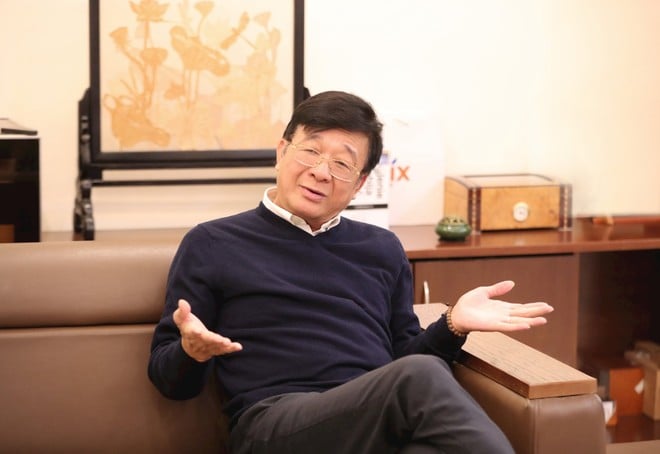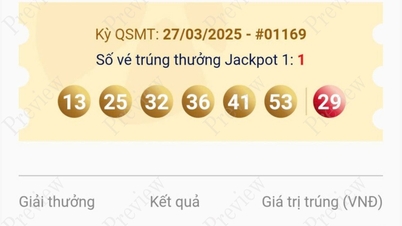ANTD.VN - Mr. Nguyen Quoc Hung, Vice Chairman and General Secretary of the Vietnam Banks Association (VNBA), said that banks should not lend for housing deposits, and it is necessary to control the use of loan capital for the right purpose in the case of capital contribution loans.
Need to tighten housing deposit loans
The Law on Real Estate Business (amended) recently passed by the National Assembly at the 6th Session of the 15th National Assembly has a number of new points such as the regulation on collecting a deposit of no more than 5% of the selling price or lease-purchase price from customers when the house or construction work has met all the conditions to be put into business; at the same time, reducing the payment rate when leasing-purchasing future houses to 50% instead of 70% as at present.
Commenting on these new regulations, Vice President and General Secretary of the Vietnam Banks Association (VNBA) Nguyen Quoc Hung expressed his agreement.
Mr. Hung said that the regulation on collecting a deposit of no more than 5% of the selling price or rental price from customers is consistent with the provisions of the Law on Consumer Protection (amended). This regulation aims to ensure that the nature of the deposit (not for the purpose of capital mobilization) has a value large enough for both the depositor and the deposit recipient to comply and meet the requirements and wishes of home buyers.
 |
Mr. Nguyen Quoc Hung |
Regarding the issue of home deposit loans, Mr. Hung said that credit institutions should not be allowed to lend only for home deposits. Because, according to the provisions of the Law on Credit Institutions and guiding circulars, for all loans (including mortgage loans using savings books), customers must have a loan plan, present a goods purchase contract, a debt repayment plan, a source of debt repayment, etc.
So, how does a customer request a bank to borrow money just for a deposit, to commit to buying a construction project? How effective is it? And what regulations does the bank base its loan on if there is no overall plan for buying a house that includes a deposit? Therefore, according to Mr. Hung, if only a loan is given for a separate deposit, the bank has no basis to lend.
Even in the case where a customer builds a plan to purchase goods, including the content of depositing to borrow capital, they must commit to having at least 20-30% of their own capital. "So, if they want to deposit to ensure the contract, why do they have to borrow capital from the bank? Because the borrower himself must have at least 20% -30% of his own capital. I cannot imagine why they have to borrow money from the bank to deposit to ensure the contract, when that is not a sales contract?" - Mr. Hung asked.
Even in the case of banks, based on the sales contract, which includes a deposit agreement to lend the deposit (if any), according to him, the bank will also face possible risks if the loan for deposit is for the seller to use. Therefore, when lending, it will agree with the customer that the money needs to be kept at the bank until the obligation is fulfilled.
“With many years of experience working in the banking industry, I have found that loans should not be given solely for the purpose of deposit. In special cases, considering the overall plan, it is possible to negotiate with customers to lend for deposits during the contract guarantee period, but that amount must be kept in the customer's or seller's deposit account but cannot be used, and can only be used when executing the sales contract. That deposit amount is included in the loan amount to buy a house according to the overall plan when proposing the loan,” said Mr. Hung.
It is impossible to abolish the regulation that banks must control the use of loan capital.
Recently, the Ho Chi Minh City Real Estate Association (HoREA) has proposed that the State Bank amend and supplement Circular No. 39/2016 to remove the regulation on "controlling the use of loans for the right purpose" by credit institutions.
The reason given by HoREA is that the customer "borrowed to pay for capital contribution according to the capital contribution contract, investment cooperation contract or business cooperation contract to implement the project", then the loan amount was transferred by the credit institution to the project investor's account, meaning that the customer who borrowed the credit used the loan for the correct purpose of "borrowing to pay for capital contribution".
However, Mr. Nguyen Quoc Hung said that according to the provisions of Clause 3, Article 94 of the Law on Credit Institutions 2010; Clauses 1 and 2, Article 24 of Circular No. 39/2016/TT-NHNN, credit institutions have the right and obligation to inspect and supervise the use of loan capital and debt repayment of customers. Clause 2, Article 14 of Decree No. 88/2019/ND-CP also stipulates administrative sanctions, with a fine of up to VND 20,000,000 for credit institutions if they violate.
With the above-mentioned regulations on sanctions by administrative sanctions, banking law has affirmed that inspection and supervision work is also a mandatory obligation for lenders, stemming from the common interests of banking activities.
“Theory and practice show that risks arising from the borrower (customer) can also be transformed into risks of the banking system. Therefore, the borrower must be aware of his obligations, strictly comply with inspection and supervision, and cannot cite any reason to delay or avoid performing this obligation.
The responsibility of credit institutions is to check before, during and after lending. The lending procedures and regulations of credit institutions are very clear, specific and need to be strictly followed" - he said.
Regarding the mobilization of bonds, Mr. Hung said that enterprises and organizations that want to issue bonds to mobilize capital must develop an issuance plan for what purpose? Where to invest? How effective? How much profit? Based on that, the mobilization interest rate will be set? Investors have the right to know whether the money is invested in accordance with the purpose of issuance? From there, they will know that the interest rate received is appropriate to the project's profitability.
Therefore, the proposal to remove the regulation on "controlling the use of loans for the right purpose", according to Mr. Hung, is against the law and international practice.
Source link



![[Photo] Prime Minister Pham Minh Chinh chairs the 16th meeting of the National Steering Committee on combating illegal fishing.](https://vphoto.vietnam.vn/thumb/1200x675/vietnam/resource/IMAGE/2025/10/07/1759848378556_dsc-9253-jpg.webp)
































![[Photo] Super harvest moon shines brightly on Mid-Autumn Festival night around the world](https://vphoto.vietnam.vn/thumb/1200x675/vietnam/resource/IMAGE/2025/10/07/1759816565798_1759814567021-jpg.webp)




































































Comment (0)